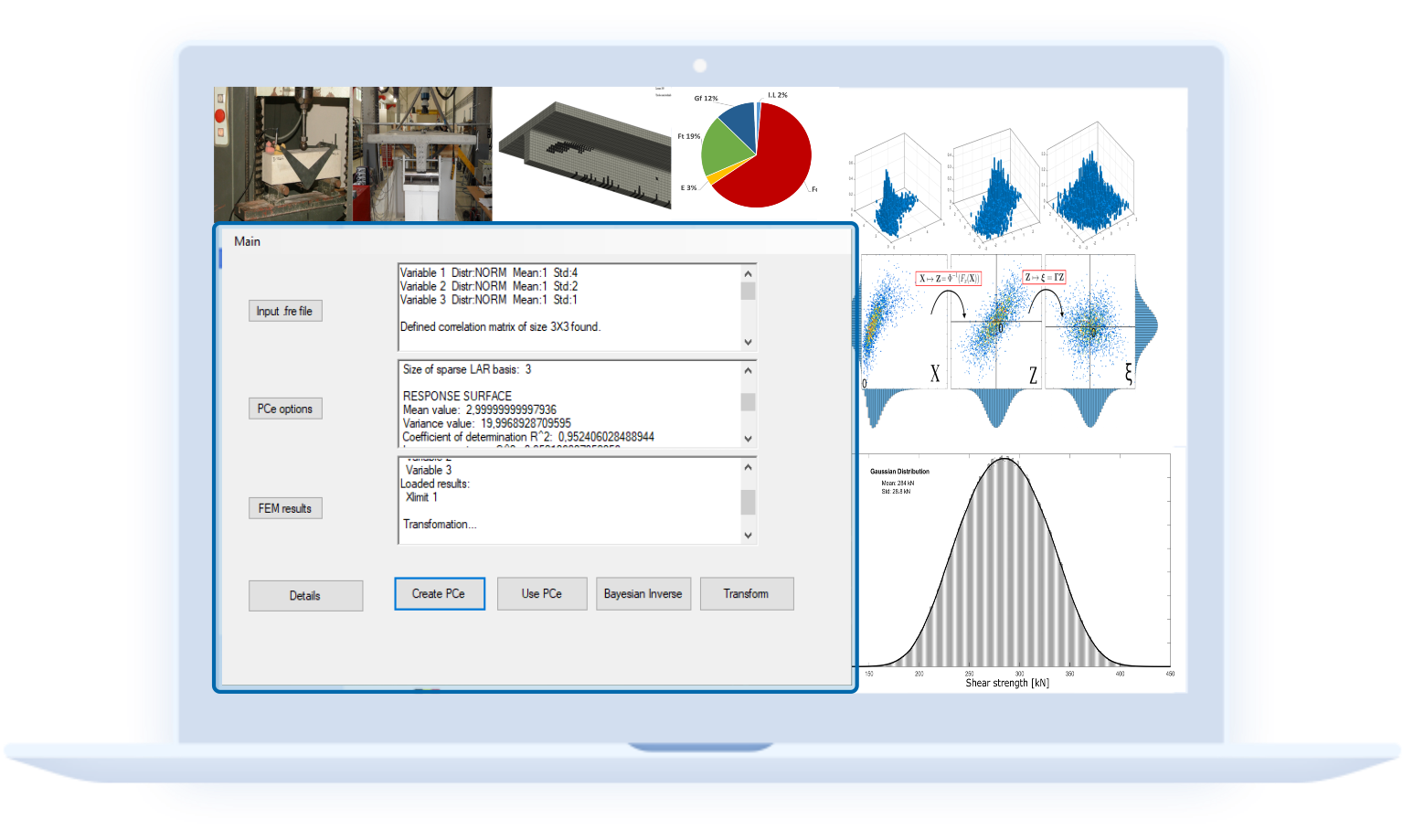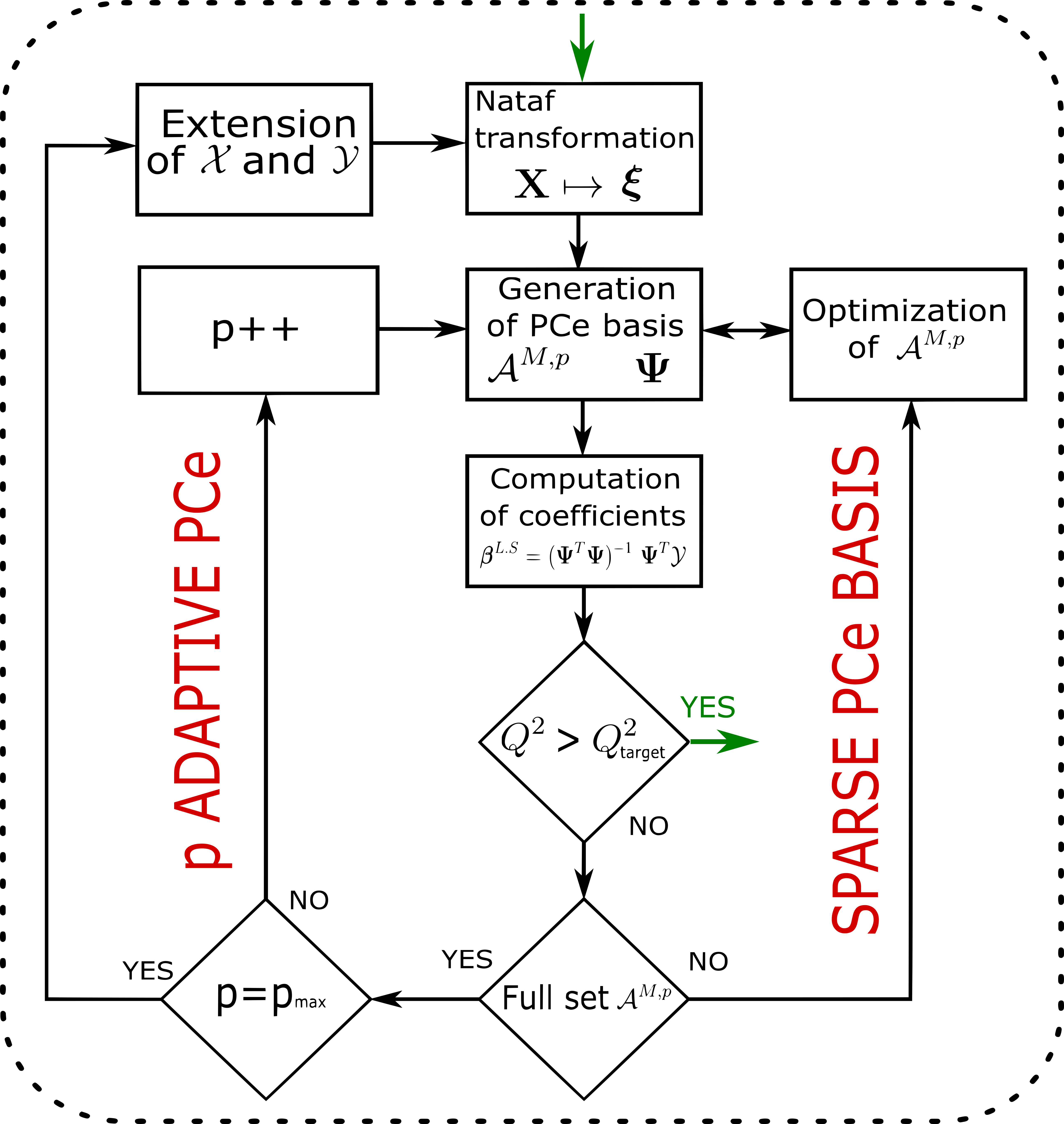PCE-UQ software
Scientific software tool for uncertainty quantification
based on Polynomial Chaos Expansion

UQ software based on
Polynomial Chaos Expansion
Standalone software tool for uncertainty quantification of mathematical models of physical systems. PCE-UQ represents efficient and easy-to-use tool for surrogate modeling of time-consuming models, sensitivity analysis and statistical analysis of stochastic functions.
The software can be virtually divided to three parts: pre-processing, processing and post-processing.
In pre-processing part, users difene stochastic model of problem (marginal distributions and correlation matrix) and create experimental design with corresponding results of mathematical model. This task can be done in cooperation with third party software (e.g. FREET).
Very last step of pre-processing is a determination of target accuracy of an approximation or maximal order of used polynomials.
Processing is fully-automatic and it contains several crucial steps deeply described in theory section. The core of processing is based on iterative best-model selection algorithm and adaptive sampling techniques.
Post-processing is designed to be easy to understand and it contains several important parts: sensitivity analysis of input random variables measured by Sobol indices and statistical analysis (first four moments) of quantity of interest. Moreover, it is also possible to use PCE as a cheap approximation of original mathematical model for time consuming analysis e.g. Monte Carlo type techniques for the estimation of low failure probability of physical systems.
The software PCE-UQ was developed with financial support of Technology Agency of the Czech Republic under project No. TF06000016.

Theoretical background
Theory of PCE-UQ was described in scientific journal paper:
L. NOVÁK; D. NOVÁK, Polynomial chaos expansion for surrogate modelling: Theory and software, Beton und Stahlbeton volume 113, ISSN:1437-1006, Austria, 2018
Additional details of PCE-UQ, theoretical inovations and several applications were described in following selected papers:
L. NOVÁK; D. NOVÁK, Surrogate modelling in the stochastic analysis of concrete girders failing in shear. In Proceedings of the fib Symposium 2019: Concrete - Innovations in Materials, Design and Structures. International Federation for Structural Concrete, 2019. p. 1741-1747. ISBN: 9782940643004.
L. NOVÁK; D. NOVÁK, R. PUKL, Probabilistic and semi-probabilistic design of large concrete beams failing in shear. In Advances in Engineering Materials, Structures and Systems: Innovations, Mechanics and Applications. London: Taylor and Francis Group CRC Press, 2019. ISBN: 9781138386969.
L. NOVÁK; L. PAN; O. SLOWIK; D. NOVÁK, Advanced reliability and sensitivity analysis of prestressed concrete girders failing in shear,proceedings of fib Ph.D.symposium 2018, Praha, Czech Republic, 2018

Applications of PCE-UQ
Prestressed concrete girders:
The very first application of PCE-UQ was during long term research of precast prestressed concete roof girders failing in shear for austrian company Franz Oberndorfer GmbH & Co KG. There were several types of girders with different geometry and reinforcement. The main task was an optimization of structural members with respect to reliability of structures.

If you are interested in software PCE-UQ and its possibilities for your applications/research, please contact main developer Lukas Novak:
Lukas Novak
novak.l@fce.vutbr.cz
Institute of structural mechanics
Faculty of civil engineering
Brno University of Technology
Czech republic
Efficient scientific software for UQ
Behaviour of real structure is always non-linear and uncertain, therefore it is crucial to analyse these uncertainties in order to design optimal structures. PCE-UQ represents powerful state-of-art software for uncertainty quantification of engineering problems.
